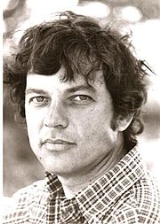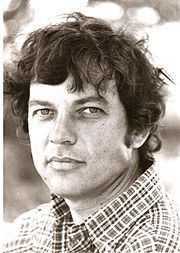
David Schütz
Encyclopedia

Israel
The State of Israel is a parliamentary republic located in the Middle East, along the eastern shore of the Mediterranean Sea...
i fiction
Fiction
Fiction is the form of any narrative or informative work that deals, in part or in whole, with information or events that are not factual, but rather, imaginary—that is, invented by the author. Although fiction describes a major branch of literary work, it may also refer to theatrical,...
writer.
Biography
David Schütz (birth name Dietmar Engbert Müllner) was born in BerlinBerlin
Berlin is the capital city of Germany and is one of the 16 states of Germany. With a population of 3.45 million people, Berlin is Germany's largest city. It is the second most populous city proper and the seventh most populous urban area in the European Union...
and immigrated to Israel
Israel
The State of Israel is a parliamentary republic located in the Middle East, along the eastern shore of the Mediterranean Sea...
at the age of seven.
He has a Master Degree in History from The Hebrew University, and has also studied cinema at the BFI
British Film Institute
The British Film Institute is a charitable organisation established by Royal Charter to:-Cinemas:The BFI runs the BFI Southbank and IMAX theatre, both located on the south bank of the River Thames in London...
.
His first book "The Grass and the Sand" was published in 1978. The book was translated into French (L'herbe et le sable : roman) and into German (Gras und Sand : roman).
Schütz has published 9 books.
Awards
Schütz has received a number literary prizes, including:- In 1988, he was awarded the Bernstein PrizeBernstein PrizeThe Bernstein Prize is an annual Israeli literary award for writers 50 years of age and younger. The prize is awarded by the Bernstein Foundation, named after Mordechai Bernstein, who left money in his estate to establish a foundation in order to encourage young Hebrew writers...
(original Hebrew novel category).
His Writing
David Schutz' experiences as a child and adolescent are central to his wiriting. His characters struggle with the aftermath of catastrophe of the Holocaust, suffering its consequences in their day-to-day existence, often from the stanpoint of a child. Schutz balances the more metaphysical elements of his writing with a solid grounding in time and place.Published books
- L'herbe et le sable, novel; translated from Hebrew by Liliane Servier (Paris: Hachette, 1981)
- Gras und Sand, novel translated from Hebrew byJudith Brüll-Assan and Ruth Achlama (Hildesheim: Claassen, 1992)
- Das goldene Tagebuch, translated from Hebrew by Mirjam Pressler (Frankfurt/Main: Ali-Baba-Verlag , 1993)
- Trilogie des Abschieds, novel, from Hebrew by Barbara Linner (Hildesheim: Classen, 1993)
- Avischag, novel, from Hebrew by Mirjam Pressler (Hildesheim: Claassen, 1996)
- Das Herz der Wassermelone, German/Israeli edition, translated from Hebrew by Pavel C. Goldenberg. With an afterword by Wolf Biermann (Hildesheim: Claassen, 1995).
External links
- David Schuts in the Institute for the Translation of Hebrew Literature http://www.ithl.org.il/author_info.asp?id=224

